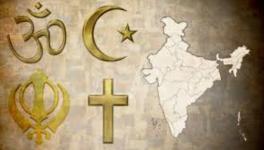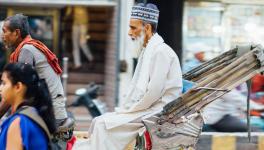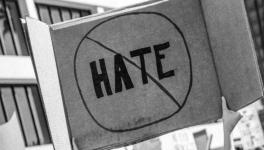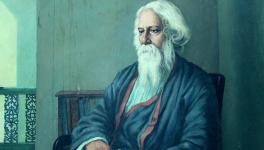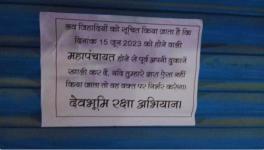The Looming Threat of Hindu Majoritarianism
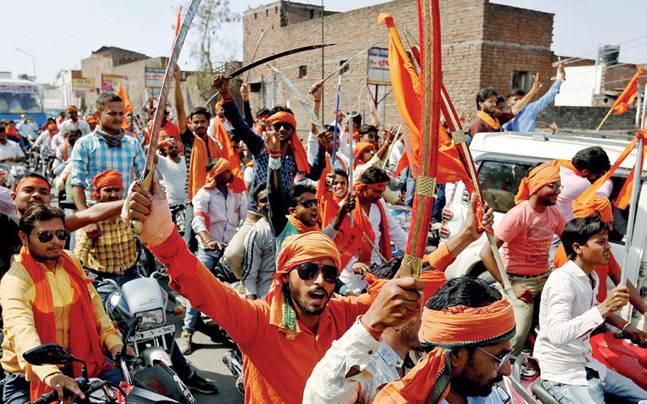
Representational image. | Image courtesy: picswe
It is by now conventional wisdom that the general elections for the 17th Lok Sabha have seen one of the most divisive poll campaigns. While polarisation was evident in 1977 with Congress on one side and every other party arrayed against it, the combination of polarisation caused by the divisive politics of psuedo-nationalist Bhartiya Janata Party (BJP) is strikingly different. A no-holds-barred promotion of Hindu majoritarianism, equating it with nationalism, by the ruling BJP is something we are all witness to.
Writing in the Indian Express, former Navy chief and scholar Arun Prakash drew attention to something that has been sidelined in the high octane election campaign with focus on “national security”. He wrote that “we need to remind ourselves that the Indian state can never consider itself truly secure unless it assures safety and freedom from fear and intimidation for each of its citizens”. He urged that “(o)nce elections are over, our politicians need to reflect on whether India can afford to have religious majoritarianism dominating the political discourse, and warned that history is “replete with examples” of empires like Ottomon and republics, such as Soviet Union, which tried to “forge multi-religious and multi-ethnic populations into nation-state, but eventually failed and fragmented...”
The Indian Navy has produced very many soldier-scholars, compared with other branches of the armed forces. But a soldier-scholar writing this today, deserves serious consideration. It has been a matter of bind faith among nationalist scholars to argue that all nation-states have historically emerged at the end of a bloody conflict and, therefore India can be no different. But must Indians pursue the same path that European nations did ages ago, in the 21st century?
At a time when being tough on national security is presented as ‘teaching-Pakistan-a-lesson’ , reducing Muslims to second class place, as well as dissidents getting targeted and projected as “anti-national”, and a government of ‘pracharaks’ promises to make even criticism of government an act of treason, Prakash’s words of caution are important.
Union Home Minister Rajnath Singh’s ministry repeatedly harps on making sedition laws “strong”. Since ‘paracharaks’ were never part of the freedom movement nor played any role in the Constituent Assembly, one can understand their innate loyalty to colonial era laws and practices. But the point raised by the former navy chief has wider resonance at a moment when “strength” is measured in military prowess, while India’s “half-empty arsenal” and heavy dependence on imports make a mockery of India’s “growing power” claim.
On the other side, much of India’s military prowess is deployed in fighting our own people. So, an already ill-equipped military force to face external threat gets degraded by prolonged deployment. Vappala Balachandran, former special secretary, Cabinet Secretariat, adds weight to this by pointing to this aspect.
Drawing attention to religious majotarianism and security, Prakash pertinently raises the question, can Indian people be secure if the country turns into “Hindu Rashtra” and if the religious minorities feel insecure and their right to life and liberty is second to that of the religious majority? Indeed, one can add, are Hindus divided as they are into castes and sub-castes, and are actually even capable of forming a majority which practices no discrimination within its fold? Thus, even carving out of Hindu majoritarianism requires coercing dissenting Hindus and lowers castes into submission.
That the Bharatiya Janata Party (BJP) wants to graft its regressive ideas on to India’s body politics through force is clearly evident. In the last five years mainstream Hindutva goons have run riot in the name of “ghar wapasi”, “love jihad”, “gau raksha” with lynching and vigilantism, knowing that they enjoy the patronage of BJP and support of police and civil administration. The fear and insecurity experienced by Muslims, dalits, adivasis and dissidents, is widespread across North India and parts of South and North-East India.
The terror unleashed by ‘gau rakshaks’ (protectors of cows) has not only destroyed the livelihood of millions of cattle breeders, slaughter houses, leather industry, but has crippled farmers, by eating into their meagre income. Such is the terror that farmers are reluctant to buy or sell cows lest they are attacked by cow vigilantes who enjoy state patronage. As though lynchings were not enough, the police have religiously begun to file cases against those who are victimised by cow vigilantes because cows enjoy sanctity of life over human beings.
Such compelling circumstances are perfect for forcing the victims to entertain the possibility of taking law into their hands. That it has not happened as yet is thanks to the minorities still reposing faith in India’s democratic-minded people and belief that elections will somehow result in bringing ‘Hindutva’ terror to an end. But what if this state of affairs does not end? Is it possible in this day and age, to shut our eyes to the possibility that constitutional democracy itself may wither away?
Take another example. A national seminar organised by the Centre for Land and Warfare Studies in November last (“Changing Contours of Internal Security”) spent a great deal of attention on “terrorism”. However, their entire focus was on “jihadi terrorism”. They did not even have the courage to acknowledge the reality that surrounds us and where Hindutvawadis’ activities are not hidden. In Jammu, they have been visible since 2008, when in the name of the Amarnath land issue and rights of pilgrims, some Jammu-based Hindutva groups looted, burnt and lynched people. Since 2014, the rest of the country is experiencing this at an even bigger scale. So, for strategic experts, who are expected to be intellectually courageous, just confining themselves to discussing ‘jihadi terror’ is outrageous when we are faced with a far bigger threat in the shape of Hindu majoritarianism and Hindutva terror groups.
Indeed, the seminar’s focus on Jammu and Kashmir demonstrated their misplaced focus on “certain issues on which Government of India is yet to take hard decisions such as Article 370, Article 35A and suggestions on trifurcating the (J&K) state”. The “hard” decision they implied was to do away with last vestige of J&K’s constitutionally mandated autonomy. This, incidentally, also applies to much of North-East.
This fits in with the shrill demand voiced by the ‘pracharak’ government and shared by many others in India who regard the very idea of autonomy as abhorrent. The Prime Minister is on record describing autonomy for J&K as something “anti-national”. Ironically, these ‘bravehearts’ who get into paroxysm speaking of Kashmir and Article 370 and 35A, remain mute where the North East is concerned. Discretion being the better part of valour, these worthies dare not raise the same regarding Article 371 A to D pertaining to North East, which provides virtually the same protection offered to J&K under Article 370. Islamophobia clearly rules the roost and is a convenient tool to keep Indians in constant state of fear and insecurity.
Lest we forget that the Army chief had alleged that one reason why Kashmiris see themselves as different is because education imparted in J&K keeps the feeling of being different alive. The absurdity of this allegation is striking because if the school education in J&K was encouraging separatism, then Jammu and Ladakh, both non-Muslim majority, would have been spearheading a shrill counter-campaign against the education system. All the noises one hears is from the extreme Right- wing quarters now getting amplified by the Army leadership.
That apart, the important point is that every state has its own school curriculum where, apart from India, they also get to study their own state’s history. It would have been brave if the Army chief, for instance, had gone to Tamil Nadu and uttered the very same reasoning regarding education. He could get away from saying this on Kashmir because the Hindu majoritarians want to assimilate Kashmir and treat its Muslim identity as a threat. As an illustration, it is worth recall that whereas Hindu fanatics regard Dogra rule as epitomising Hindu resurgence, the fact is that Dogra Hindu rule was cruel on low-caste Hindus of Jammu and Muslims of Kashmir. And today when the ‘pracharak’ government wants to “mainstream” Kashmir, what this means is denying Kashmiris their cultural specificity of being Muslims with a history of their suffering, as also denying them any agency of their own being presented as “proxy” for an inimical enemy.
Such blindspots and pathetic understanding of the Kashmir problem, premised on Hindu majoritarian fantasies, has caused enough problems and has indeed exacerbated the conflict. To persist with and pursue such a misconceived perspective, has made India more insecure.
In other words, given India’s diversity, any attempt to straitjacket everything into the mainstream, that too one in which lynching and vigilantes thrive and the law and order machinery turns partisan, then it is a sure shot recipe for disaster.
A military which has a much longer history of fighting its own people for decades on end, cannot remain unaffected. This does impact the morale and motivation of the forces and the high incidence of stress and related problems, which are a fallout of this, does leave its mark. In other words, when resources are in short supply, to prioritise conflicts at home will result in a “half empty arsenal”. And import dependence makes us vulnerable to big power arm-twisting. Look at how meekly the “strong” BJP government surrendered to US diktat after boasting that India will never give into unilateral sanctions. If to this is added prolonged deployment in armed conflict internally, the hollowness of the rhetoric of “being tough on national security” shows itself as an empty boast.
In other words, strength lies in protecting life and liberty of all citizens, without fear and bias. Else, as the former navy chief warns, India is doomed to live under insecurity for a long time to come.
Get the latest reports & analysis with people's perspective on Protests, movements & deep analytical videos, discussions of the current affairs in your Telegram app. Subscribe to NewsClick's Telegram channel & get Real-Time updates on stories, as they get published on our website.










